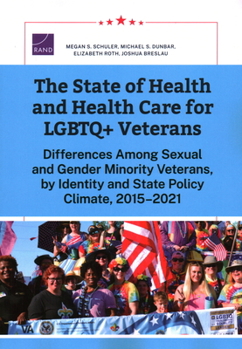The State of Health and Health Care for LGBTQ+ Veterans: Differences Among Sexual and Gender Minority Veterans, by Identity and State Policy Climate,
The authors use data from the Behavioral Risk Factor Surveillance System to describe health care access and health outcomes for lesbian, gay, bisexual, transgender, queer, and other sexual and gender minority (LGBTQ+) veterans and examine associations between health outcomes and state policy environments in which LGBTQ+ veterans live, and discuss implications for ongoing efforts to improve health and well-being among LGBTQ+ veterans.
Format:Paperback
Language:English
ISBN:1977413323
ISBN13:9781977413321
Release Date:August 2024
Publisher:RAND Corporation
Length:100 Pages
Weight:0.42 lbs.
Dimensions:0.2" x 7.0" x 10.0"
Customer Reviews
0 rating





